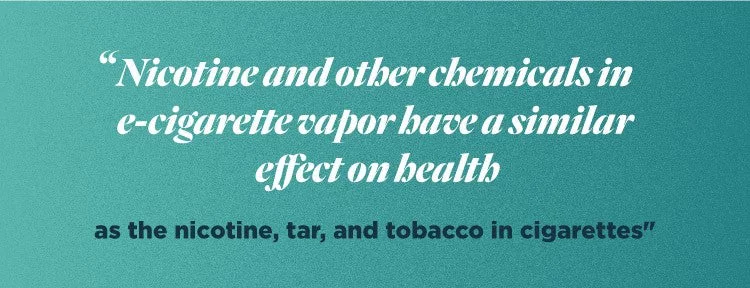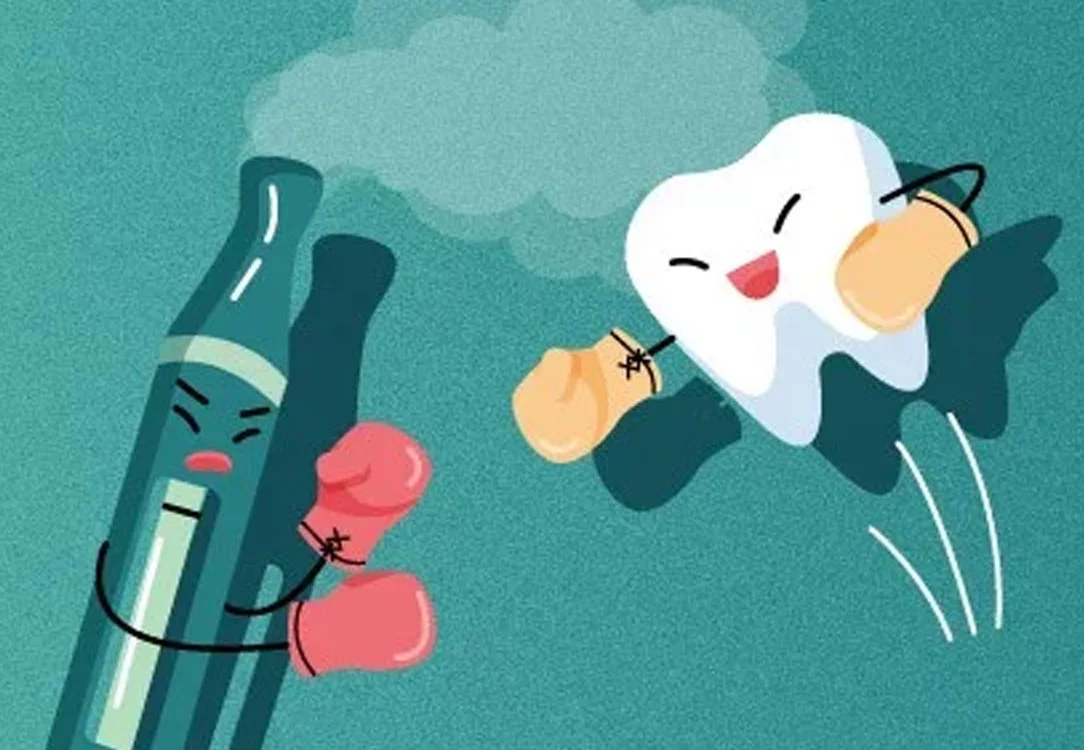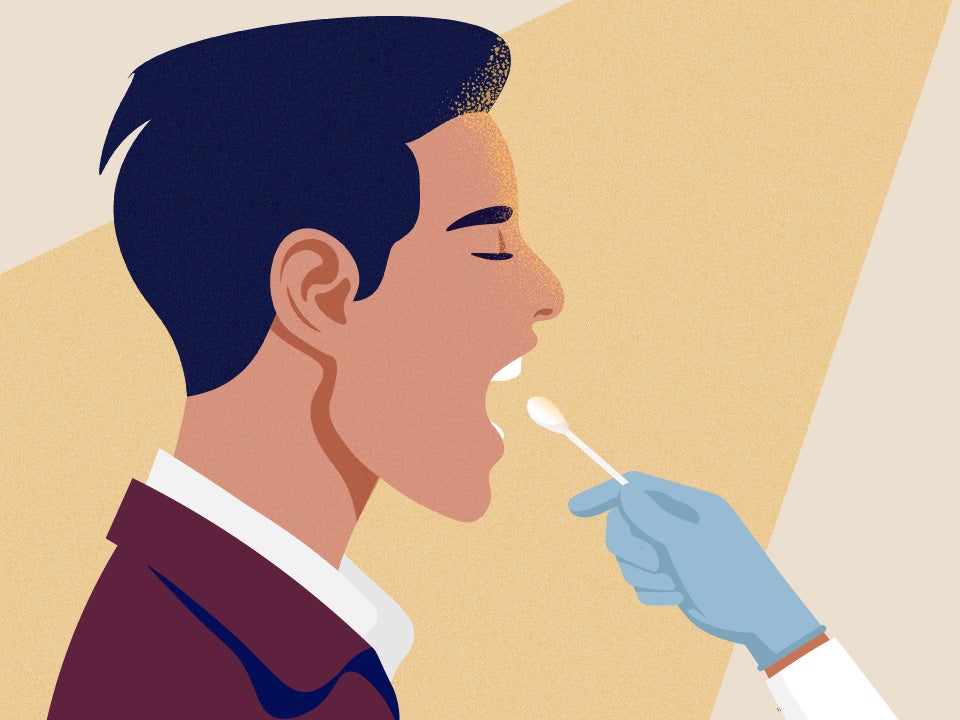When e-cigarettes came on the scene, many people hailed them as the answer to a healthier way of smoking while avoiding the difficulties of quitting tobacco products altogether. The use of e-cigarettes, also known as vaping, uses nicotine in many e-cigarette cartridges. Unlike the common misconception that smoke and tobacco are the only cancer-causing villains of smoking, it is possible that nicotine actually plays a much larger role in causing adverse health concerns than society once thought.
What is Vaping?
Is vaping better or worse for my teeth?
While vaping does not contain tar or cigarette smoke, it can still have a negative impact on your teeth because it does contain nicotine. Nicotine is responsible for tooth staining and poor blood circulation, and it allows bacteria and plaque to build up more quickly, leading to a higher chance of developing tooth decay. A study compared the severity index in developing periodontal disease and oral infections in non-smokers, e-cigarette users, and traditional cigarette smokers — the breakdown is as follows:
- Non-smokers: 28.2%
- E-cigarette users: 42.5%
- Smokers: 72.5%
Can vaping destroy my teeth?
While e-cigarette users certainly create more of an uphill battle for themselves when it comes to keeping their teeth and gums healthy, there are more factors to consider before deciding that vaping is completely destructive to your teeth. With nicotine showing negative health implications on oral health, some e-cigarette users can opt for cartridges containing low levels of nicotine or even no nicotine whatsoever. Oral hygiene habits continue to help keep people’s mouths healthy even if they vape. Brushing twice a day, flossing daily, and visiting your dentist every six months are deciding factors in the health of your mouth. However, giving up e-cigarettes and any other form of nicotine would do your oral health and overall health a great benefit.
Can a dentist tell if you vape?
It is possible for a dentist to determine if you vape during a visual exam by looking at possible staining, and increased evidence of gum disease and damaged teeth. This possibility of developing tooth or gum issues should give you all the more reason to see your dentist regularly.

Does Vaping Affect Your Oral Health?
Though more studies need to be done, there is evidence that the use of e-cigarettes can have a negative result on your oral health. The American Dental Association has even gone so far as to say they support a ban on vaping products and want to see more research on what impact e-cigarettes have on health. Nicotine and other chemicals in the e-cigarette vapor have a similar effect on health as the nicotine, tar, and tobacco in cigarettes, which have health concerns that are well documented. More research is needed to determine to what degree health is affected by e-cigarettes.
Vaping Side Effects
- Restrict blood vessels in your gums
- Inhibit the production of saliva in your mouth
- Stimulate the muscles in your mouth and jaw
- Stain or discolor your teeth
But it is not only nicotine that causes side effects in e-cigarette users. One study suggests the flavor in the vapor can also cause inflammation in gum tissue which can lead to many oral health risks.
Health Risks
- Periodontal disease
- Cavities
- Damaged teeth due to increased possibilities of developing bruxism from oral muscle stimulation
- Heart attack
- Stroke
- Oral cancer

Can Vaping Stain Teeth?
Much like smoking, vaping can make your teeth yellow. Nicotine in e-cigarettes can cause teeth to become deeply stained. While there are many low nicotine products to choose from for vaping, including flavors that have no nicotine at all, for those who use e-cigarettes as a way to stop smoking, vaping with nicotine helps to curb their cravings.
Should you brush your teeth after vaping?
Can Vaping Cause Gum Disease?
Unfortunately, vaping can do a real number on your gums, leading to gum recession, gum damage, and even tooth loss. When the blood vessels are restricted, the life-giving blood cells can not deliver oxygen to all the places that need it. When nicotine aids this restriction of blood vessels in your mouth, the gums are starved of oxygen and the gum tissue begins to die, causing the gums to recede. Adding in flavored e-liquids that can cause gum inflammation, it is clear that you can really mess up your gums by using e-cigarettes if you do not monitor your oral health with care.
Can Vaping Cause Cavities?
Vaping can have an impact on your mouth’s ability to make saliva, leading to dry mouth. Saliva is a crucial substance that brings healthy minerals to the teeth while regularly washing away food particles and bacteria. Because vaping can disrupt saliva production, the likelihood of getting a cavity increases. In regards to some e-juices containing sweet flavors, studies show the number of flavored e-cigarettes consumed has a similar impact on developing cavities as eating candy or drinking acidic drinks.
Vaping After Wisdom Teeth Removal
After wisdom teeth are removed, your oral surgeon will give a list of activities to avoid for several days to ensure the wounds heal without further complications. Protecting the newly formed blood clot in the tooth cavity is essential for healing. Vaping or traditional smoking are highly advised against during the first 96 hours post-surgery because as you inhale, the suction created could dislodge the blood clot, causing painful dry socket. Good blood flow is also important to the healing process. Healing after wisdom teeth removal can be delayed, and infections and abscesses are more likely to occur if you vape.
Find a Dentist
In short, though e-cigarettes may not be as dangerous to your health as traditional cigarettes, we are learning more about the negative effects of vaping with each new study. The nicotine, chemicals, and flavors in e-cigarettes clearly cause oral damage. Hence, if you vape, the need to have a trusted dentist routinely check your mouth for tooth decay and damaged gums is greater. To find a dentist in your community, check out our Find a Dentist Tool.
Find your trusted, local dentist today!
Sources
- Kim, S. A., Smith, S., Beauchamp, C., Song, Y., Chiang, M., Giuseppetti, A., Frukhtbeyn, S., Shaffer, I., Wilhide, J., Routkevitch, D., Ondov, J. M., & Kim, J. J. (2018, September 7). Cariogenic potential of sweet flavors in electronic-cigarette liquids. NIH. https://www.ncbi.nlm.nih.gov/pmc/articles/PMC6128655/
- Pushalkar, S., Paul, B., Li, Q., Corby, P., Li, X., & Saxena, D. (2020, February 26). Electronic cigarette aerosol modulates the oral microbiome and increases risk of infection. iScience. https://www.cell.com/iscience/fulltext/S2589-0042(20)30068-7
- Sanner, T., & Grimsrud, T. K. (2015, August 31). Nicotine: Carcinogenicity and effects on response to cancer treatment – A review. NIH. https://www.ncbi.nlm.nih.gov/pmc/articles/PMC4553893/
- American Dental Association. (2022, July 6). Smoking, non-cigarette alternatives. Mouth Healthy. https://www.mouthhealthy.org/all-topics-a-z/smoking-alternatives
- Sundar, I. K., Javed, F., Romanos, G. E., & Rahman, I. (2016, October 24). E-cigarettes and flavorings induce inflammatory and pro-senescence responses in oral epithelial cells and periodontal fibroblasts. NIH. https://www.ncbi.nlm.nih.gov/pmc/articles/PMC5363580/
Smile Generation blog articles are reviewed by a licensed dental professional before publishing. However, we present this information for educational purposes only with the intent to promote readers’ understanding of oral health and oral healthcare treatment options and technology. We do not intend for our blog content to substitute for professional dental care and clinical advice, diagnosis, or treatment planning provided by a licensed dental professional. Smile Generation always recommends seeking the advice of a dentist, physician, or other licensed healthcare professional for a dental or medical condition or treatment.







.png)
